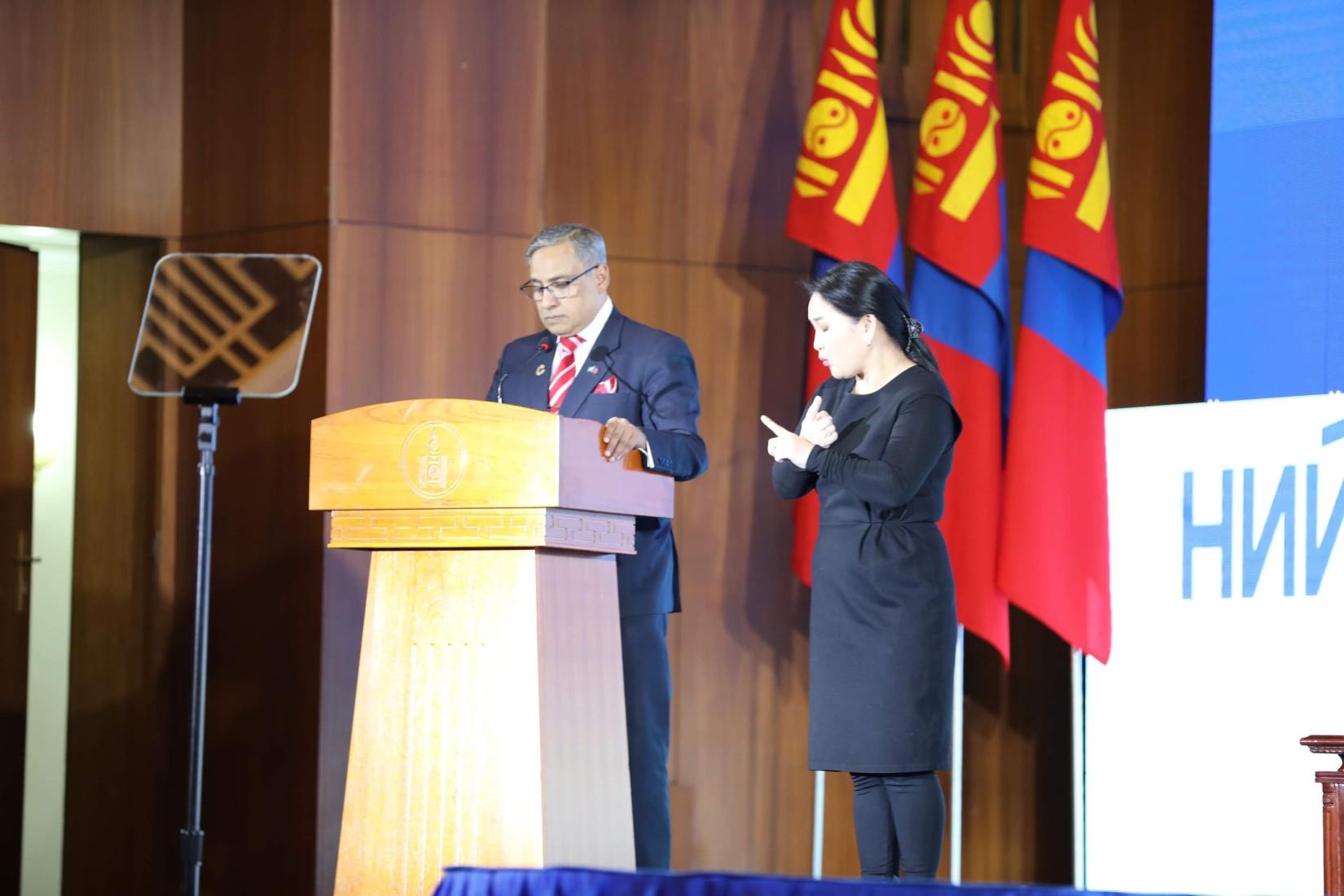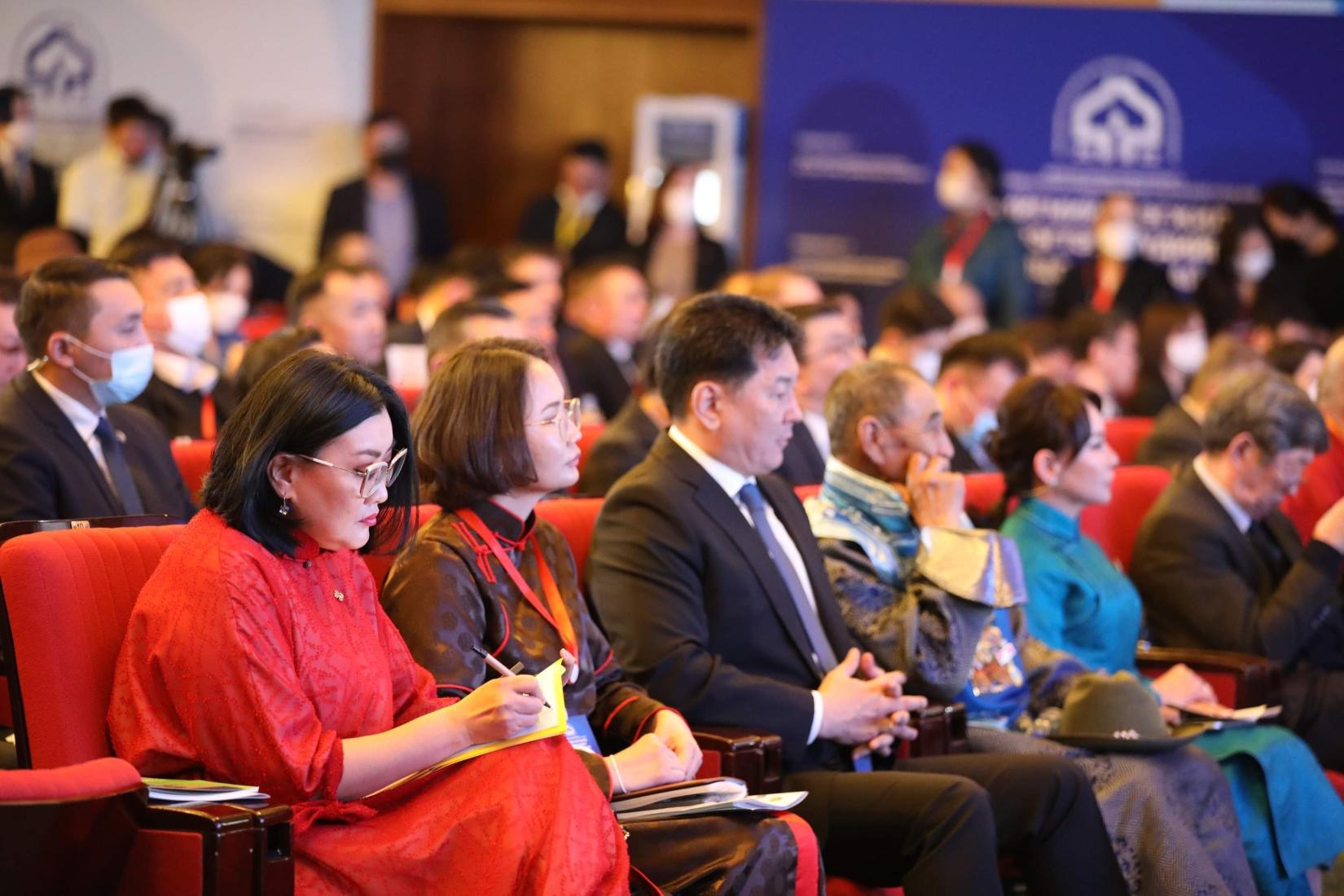Gender equality is not about empowering women only. It is about ensuring equal opportunities for both men and women.
Remarks by Tapan Mishra, UN Resident Coordinator in Mongolia at the National Forum on "Men's participation and leadership in social development"

14th March 2022
Your Excellency, Mr. U.Khurelsukh, the President of Mongolia
Your Excellency, Mrs A. Aruinzaya, the Minister for Labour and Social Protection of Mongolia,
Your Excellency Mrs A. Adiyasuren, Member of Parliament,
Excellencies, and ladies and gentlemen,
I am honoured to have this opportunity to speak to you, today, at this important event.
Gender equality is not about empowering women only. It is about ensuring equal opportunities for both men and women.
I must laud Mongolia’s tremendous efforts and progress in achieving gender equality in terms of empowering women, as envisaged in SDG 5. The Law on Gender Equality has been instrumental in reducing gender disparities in Mongolia.

Now, we must also focus on empowering men and leveraging their roles in the greater equality in political and socio-economic development in Mongolia.
Today, I would like to highlight four key points where we need to focus our attention.
First, it is crucial for us to bring a greater focus on men’s health, learning that men’s life expectancy is almost 10 years shorter than that of women in Mongolia, mainly factored by risky behaviours and unhealthy lifestyles such as smoking, use of alcohol and poor and unbalanced diet.
Harmful and toxic beliefs such as men should be physically strong, emotionally callous, and not to show emotions or ask for help discourage men from getting mental health and psychological support.
Men are increasingly suffering from anxiety and depression, possibly related to concerns over diminishing livelihoods and other challenges they may face. For this, it is essential to revisit the National Strategy to promote men’s health and positive behaviours and strengthen our efforts and support in improving the health and wellbeing of all men and boys.
Secondly, I urge the Government and stakeholders in the education sector to take comprehensive and inclusive policies and actions on equity and access to education for both girls and boys.
A recent study highlighted that number of boys dropping out of school is increasing with each grade. This is even more concerning about boys in rural areas. We see more rural boys tend to be left behind as they drop out of schools to help the family in herding while girls continue their education further and higher. As a result, we see a gender imbalance in tertiary education, where female students make up more than 60 per cent.
As we speak about challenges boys and men face in the education sector, it is worth having a relook at Mongolia’s current practice of children starting compulsory education at the age of six, as well as the quality of education nationwide. This has brought constraints on the rural and herding families. Herding families are separated due to the education need of their young children. This often leads to family issues including divorce, which were confirmed in all of the Aimags. Therefore, it is important to address this issue in the education sector policy reform, seeking innovative approaches in educating young generations in rural Mongolia.
Thirdly, in order to empower men as the driving force for the country’s development, we must provide men from marginalized communities with stable employment and income-generating opportunities, particularly in rural areas and in sectors with seasonal and informal jobs such as construction, mining, agriculture and tourism. More than half of workers in the informal economy are men, and men work much longer hours than women. It’s an average of 54 hours per week, which is at least 10 hours more than the average working hours at the national level.
Another alarming statistic may come from occupational accidents and acute poisoning. Men are twice as likely to get injured at workplaces, whereas, as of 2020, fatalities happened due to occupational accidents are all men.
Offering life-long learning opportunities for men from a very young age, from academic training to livelihood and survival skills, and other types of occupational skills that match the labour market demand would be crucial for many boys and men of this country to survive and overcome challenges, both economic and social.
Another critical issue that needs our attention is the migration of the young workforce. We see more young Mongolian men, especially those of 26-38 years old, emigrating overseas for labour, causing different socio-economic consequences at both family and economic levels. Considering that this is both demand and supply-driven, the government negotiated labour migration contracts with destination countries, especially circular migration contracts, which could significantly mediate the situation. While addressing both internal and external migration issues, we must also take preventive measures for potential labour exploitation which is more prevalent among male migrant workers.
Fourth and lastly, I would like to stress men’s immense roles in promoting gender equality and women’s rights. Mongolia needs more male champions and advocates for building a more equitable and fairer society. Therefore, I challenge all Mongolian men and boys to stand up and speak out for the rights of women and girls as well.
To conclude, I congratulate the Government of Mongolia for this event, spotlighting the challenges and opportunities for Mongolian men, giving us an important forum to address the root causes of the current challenges men face today.
Here I would like to echo the words of Noble Peace Prize winner, and a South African theologian and human rights activist Desmond Tutu, “There comes a point where we need to stop just pulling people out of the river. We need to go upstream and find out why they’re falling in.”
With this note, I reiterate that the UN Mongolia stands ready to support the upstream journey of the Government and people in Mongolia to deal with the root causes that hinder men’s positive roles and leadership in the country’s inclusive, equitable and sustainable development. I am sure that with our collective efforts, we can overcome this challenge.
Сайн сайхныг хүсье. Баярлалаа.





